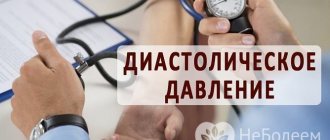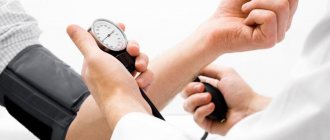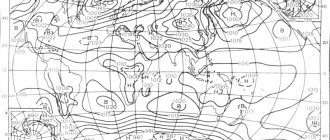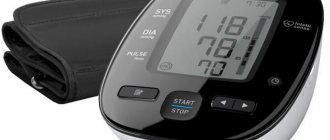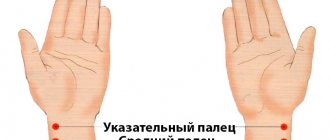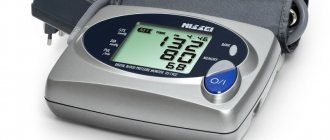Arterial pressure
Blood pressure (BP) is the pressure that blood exerts on the walls of blood vessels. This is one of the vital health indicators. It is measured in millimeters of mercury (mmHg) and is interpreted based on two values:
- systolic pressure (“top”): the pressure of the blood when your heart contracts and pushes blood into the arteries;
- diastolic pressure (“lower”) is the blood pressure at the moment the heart muscle relaxes between two contractions.
The ratio of these indicators is usually considered in the context of norm, pathology or temporary disorder.
Blood pressure levels are individual for each age and gender. But the World Health Organization scale is considered to be a general guideline for assessing blood pressure.
Disturbances in the functioning of the circulatory system, and with it cardiac activity and blood pressure, can occur in humans regardless of gender and age. However, you should understand in which case high blood pressure is associated with the development of the disease, and in which cases jumps in blood pressure occur situationally (emotional shock, alcohol and tobacco use, nervous tension, active physical activity).
In a healthy person, an increase in normal values by 10–15 mmHg is acceptable with age. If an age-related increase in pressure is indicated by a sharp jump, frequent attacks of hypertension, then this is not associated with age, but often with the development of a disease of the cardiovascular system. Ignoring such symptoms and waiting for age-related stabilization of blood pressure to occur is dangerous.
How to lower blood pressure and cure hypertension?
Hypertension is a chronic cardiovascular disease. It cannot be cured completely, but symptoms can only be relieved with medication. Hypertensive patients are dependent on medications, have limited diet and exercise, and are always at risk of developing new diseases.
To maintain quality of life, it is important to minimize risks before the disease actively develops. This can be done using the Atlas genetic test, which includes information about predisposition to the disease, as well as recommendations for prevention.
To treat high blood pressure, you need to consult a specialist. But below you will find tips for preventing and controlling hypertension.
- Reduce salt intake (no more than 1.5 g per day)
- Limit consumption of foods high in saturated fats and trans fats
- Avoid or reduce consumption of sugar, alcohol, coffee and tobacco
- Increase the amount of fruits and vegetables in your diet
- Exercise regularly
- Reduce and control stress conditions
- Measure blood pressure regularly
- Treat high blood pressure and other conditions with the help of a specialist.
In case of a hypertensive crisis, you must call a doctor and not self-medicate. Traditional methods will also not be beneficial. There are many medications available to lower blood pressure. Depending on the symptoms and characteristics of the body, doctors recommend:
- ACE inhibitors
- Angiotensin II receptor blockers
- Calcium channel blockers
- Diuretics
- Alpha blockers
- Beta blockers
Most people need to take more than one type of medicine to better control their blood pressure.
Causes of high blood pressure
Depending on which of the two pressure indicators is elevated (upper or lower), it is customary to consider the picture of the state of health.
Common causes of high blood pressure include:
- being in a state of prolonged, chronic stress and nervous tension;
- short-term bursts of emotional or mental activity, since adrenaline (stress hormone) speeds up the heart, affecting the tone of blood vessels;
- a high concentration of sodium and calcium in the blood, at which frequent spasms of the smooth muscles from which the entire vascular system is “woven” occurs.
- high cholesterol, the formation and accumulation of atherosclerotic plaques on the walls of blood vessels, which over time leads to a narrowing of the lumen of blood vessels, which impairs blood flow. In this case, the heart is forced to work harder to move blood through the vessels, which causes the development of chronic hypertension.
- regular use of alcohol, tobacco, smoking mixtures, psychotropic substances. Under the influence of the chemical composition of which fluctuations in vascular tone occur, the functioning of the kidneys and other body systems is disrupted.
- course or frequent use of medications: oral contraceptives, appetite suppressants, glucocorticoids.
- diabetes mellitus, kidney and liver diseases, thyroid diseases
- excess weight and inactive lifestyle, asthenia
- blood thickening and dehydration, which make it difficult for the cardiovascular system to pump blood
- violation of diet, consumption of mineral salts, smoked spicy foods on a regular basis
- diseases of the spine, in which pinched nerve roots occur, increased muscle tone, which lead to impaired blood supply to blood vessels.
- heredity
However, looking at the readings of the measuring instruments, one should distinguish between high upper pressure and high lower pressure. Because both the risks of health complications and the choice of therapy depend on this.
High top pressure
When the upper (systal) pressure increases, aching headaches appear, with pulsation occurring. There may be pressure on the eyeballs, a feeling of swelling of the face.
The symptoms of high upper pressure are similar to intracranial pressure. Which develops as a consequence of impaired circulation of cerebrospinal fluid.
- if the upper pressure is increased, an irregular heart rhythm (arrhythmia) and aching chest pain may occur. Some people, if they have such symptoms, may panic and attribute their occurrence to heart problems.
- when the upper pressure increases to 150 mm Hg. Art. an adult may develop a hypertensive crisis, which causes pathological changes in the coronary arteries and heart muscles.
- angina pectoris develops, the left ventricle enlarges and cardiac output decreases, therefore heart failure develops, and with it the risks of developing myocardial infarction arise.
High bottom pressure
Lower pressure means the pressure in the blood vessels during maximum relaxation of the heart, before a new contraction. An increase in this indicator means that fluid is poorly removed from the body. Lower pressure is also called “renal pressure”. The kidneys, passing blood through themselves, act as a filter, regulate the water-salt balance of the body and remove toxins from the blood along with urine. If the lower pressure indicator fails, then you should start looking for problems in the kidneys, which for some reason cannot cope with their work.
Risk factors for developing hypertension
There are a number of conditions that influence the occurrence and development of hypertension. About sixty percent of adults have some risk factor for hypertension, and half of them have more than one factor, resulting in a significantly increased overall risk of the disease.
Heredity
Arterial hypertension in first-degree relatives (father, mother, grandparents, siblings) reliably means an increased likelihood of developing the disease. The risk increases even more if two or more relatives have high blood pressure.
Floor
Men are more predisposed to developing arterial hypertension, especially at the age of 35-50 years. However, after menopause, the risk increases significantly in women.
Age
High blood pressure most often develops in people over 35 years of age. The older a person is, the higher their blood pressure numbers tend to be.
Stress and mental strain
The stress hormone adrenaline causes the heart to beat faster, pumping more blood per unit of time, resulting in increased blood pressure. If stress continues for a long time, then the constant load wears out the blood vessels. Increased blood pressure becomes chronic.
Alcohol consumption
This is one of the main reasons for high blood pressure. Daily consumption of strong alcoholic drinks increases blood pressure by 5-6 mm. rt. Art. in year.
Atherosclerosis
Excess cholesterol leads to loss of elasticity in the arteries, and atherosclerotic plaques narrow the lumen of blood vessels, which makes it difficult for the heart to function. All this leads to increased blood pressure. However, hypertension, in turn, spurs the development of atherosclerosis, so these diseases are risk factors for each other.
Smoking
When components of tobacco smoke enter the bloodstream, they cause vasospasm. Not only nicotine, but also other substances contained in tobacco contribute to mechanical damage to the walls of the arteries, which predisposes to the formation of atherosclerotic plaques in this area.
Excess dietary sodium
Modern man consumes much more table salt with food than his body needs. Excess salt in the body often leads to spasm of the arteries, fluid retention in the body and, as a consequence, to the development of arterial hypertension.
Physical inactivity
People who lead a sedentary lifestyle are 20-50% more likely to develop hypertension than those who are actively involved in sports or physical labor. An untrained heart copes worse with stress, and metabolism is slower. In addition, physical activity helps cope with stress, while physical inactivity weakens the nervous system and the body as a whole.
Obesity
Overweight people have higher blood pressure than thin people. This is not surprising, since obesity is often associated with other listed factors - an abundance of animal fats in the diet (which causes atherosclerosis), consumption of salty foods, and low physical activity. It is estimated that every kilogram of excess weight means an increase in blood pressure by 2 mmHg.
If you have counted at least two risk factors, the risk of developing hypertension is already quite high. We advise you to pay attention to prevention and periodically be examined by a therapist or cardiologist.
Symptoms of high blood pressure
There are no specific symptoms typical for hypertension. Therefore, sometimes, seemingly without apparent reason or alarm bells, strokes and heart attacks occur even in young people. And those symptoms that may indicate high blood pressure are ignored.
Among the common ones:
- headache in the temporal or occipital part of the head
- dizziness
- weakness and tremors
- nausea
- dyspnea
- blurred vision, flashing spots before the eyes
- tachycardia
- swelling (in case of increased lower pressure)
On a note:
- Hypertension is a multifactorial disease that manifests itself as a persistent increase in blood pressure and depends on genetic predisposition and lifestyle.
- Men over 55 years of age and women over 65 years of age are at risk for the disease. However, the disease is also common among young people and children.
- Hypertension is a “silent killer” because it is often asymptomatic. To find out the presence of the disease, you need to regularly monitor your blood pressure levels and consult a specialist. Genetic testing will help determine predisposition and prevent the development of the disease.
- If your blood pressure suddenly increases, it is important to call a doctor or take medications recommended by a specialist. Self-medication with folk remedies for this condition is ineffective and even dangerous.
- Risk factors for high blood pressure: age, heredity, lack of physical activity, excess weight, smoking, alcohol, excess salt and lack of potassium, stress and chronic diseases.
- Hypertension negatively affects all areas of a person’s life. A hypotensive person must take medications regularly, limit diet and exercise. Headaches, cerebrovascular accidents, edema, increased risk of developing atherosclerosis, heart and kidney diseases are companions of arterial hypertension.
- Hypertension cannot be cured, but symptoms can be controlled with medications and its progression can be prevented with a balanced diet, regular exercise and stress reduction.
Sources:
- Oparil S. et al., Hypertension Review
- Williams B. et al.,2018 ESC/ESH Guidelines for the management of arterial hypertension: The Task Force for the management of arterial hypertension of the European Society of Cardiology (ESC) and the European Society of Hypertension (ESH)
- Umemura S. et al.,The Japanese Society of Hypertension Guidelines for the Management of Hypertension
- Curfman G. et al., Treatment and Control of Hypertension in 2020: The Need for Substantial Improvement
- High blood pressure (hypertension)
- High blood pressure//Prevention//Causes//Diagnosis//Treatment
How to reduce high blood pressure at home
High blood pressure is a very serious symptom. Therefore, any therapy should be prescribed strictly under supervision and on the recommendation of a specialist!
However, regular blood pressure medications should be in your home medicine cabinet, especially if there are real prerequisites.
- If the increase in pressure is situational in nature and caused by emotional or nervous shock. First of all, you should balance your breathing, find ways to calm down and relax as much as possible. Among the medications you can use: sedatives of plant origin, for example: novo-passit, persen, valerian tab, motherwort extarct tablet and others.
- To reduce blood pressure, diuretics can be used as part of complex therapy or as an independent remedy: Their selection and prescription, as well as the choice of dosage, is carried out by the doctor.
- If hypertension is an established chronic disease and another attack occurs, it is important to take as quickly as possible: Emergency drug Captopril 25 mg sublingually 0.5-1 tablet, and consult a doctor as soon as possible.
What examinations are also prescribed?
In most cases, hypertension is caused precisely by disorders of the blood vessels and heart. In 5-10% of cases, the root cause may be kidney problems, endocrine changes, stress, neurological factors, or even the use of certain supplements and medications. The doctor needs to determine what caused the disease. For this purpose, diagnostics, as a rule, is not limited to simply measuring pressure. Additionally, the following examinations are carried out:
- electrocardiography and echocardiography;
- Ultrasound of the kidneys and other organs of the urinary system;
- Ultrasound of the thyroid gland; computed tomography of the adrenal glands, skull;
- laboratory tests, including urine and blood tests for hormones.
Additionally, consultation with related doctors, including nephrologist, urologist, endocrinologist, neurologist, etc., is recommended.
It is also important to determine the stage and severity of hypertension and the risk of complications. This may require examinations such as:
- stress tests with blood pressure measurement;
- daily blood pressure monitoring;
- fundus examination;
- blood biochemistry for cholesterol, etc.
Preventing high blood pressure
Preventing high blood pressure is an important measure to prevent dangerous conditions and negative health consequences. Paying close attention to your body will protect it from dangerous diseases of the cardiovascular system. Considering that any disease can be aggravated by unfavorable heredity, it is important to approach the issue of preventing systemic diseases with particular care.
Primary prevention of high blood pressure
Primary prevention of hypertension involves preventive measures against blood pressure disorders in principle, exclusion of potential risk factors from lifestyle: bad habits, excessive physical activity, uncontrolled diet and diet.
Secondary prevention of high blood pressure
Secondary prevention means control of an existing disease and strengthening the stage of remission of hypertension, eliminating risk factors for the development of coronary heart disease, heart attack, and stroke. In addition to lifestyle correction measures, it also includes medications, vitamin health support, and physical therapy. Due to the great capabilities of modern medical equipment production, physiotherapy can be carried out at home.
The concept of mental hygiene plays an important role in the prevention of high blood pressure. Which implies reducing psychological and emotional tension, minimizing stressful situations and the ability to respond correctly to them.
Be healthy!
Still have questions? Ask them to us in the comments, we will definitely answer!
Borderline level of hypertension
There is another name for borderline hypertension - labile. The increase in pressure in this case is unstable, its readings vary from normal to borderline elevated. Irreversible disorders do not occur in the labile form of hypertension, there are usually no symptoms, such an increase in pressure does not affect the state of health, it always normalizes on its own, so there is no need to resort to medications. However, people with borderline hypertension are always at risk of developing overt hypertension at some point. Therefore, monitoring blood pressure in this situation will not be superfluous. This is especially true for people who are over 30 years old, as well as those who are overweight or have poor heredity.
Borderline hypertension is most often temporary and can be observed in the following cases:
- during menopause in women;
- in athletes, under excessive loads;
- with alcohol intoxication;
- nervous disorders, in stressful situations;
- during puberty in adolescence.
In case of low blood pressure we speak of hypotension. The tonometer readings for hypotension are as follows: 90 to 60 and below. Low blood pressure also causes a lot of trouble. A person in this state feels weakness, drowsiness, chronic fatigue, dizziness, his skin turns pale, and his limbs are constantly cold. Hypotonic people are usually people of asthenic physique.
The danger of hypotension is poor blood saturation of the entire body and, as a result, a hypotonic crisis (the pulse weakens, breathing becomes difficult, loss of consciousness, bleeding of the skin and limbs is possible). In such a situation, it is necessary to increase the level of pressure as quickly as possible, for this there are special medications, at home a cup of strong coffee or tea, a contrast shower, a stimulating massage will help, various herbal tinctures (eleutherococcus, ginseng, echinacea) are effective.
Treatment without drugs
Bad habits and some features of modern lifestyle increase the risk of developing hypertension:
- smoking. One cigarette smoked causes an increase in blood pressure for half an hour, also increasing the heart rate. And the constant presence of nicotine in the blood leads to a persistent increase in blood pressure;
- overweight and high blood cholesterol;
- low level of physical activity;
- increased blood glucose levels can be caused by excessive consumption of sweets, fast food, etc.
If you normalize your lifestyle and diet, lose weight, and give up harmful habits, then your blood pressure can return to normal.
Drug treatment
If the measures described above do not help, then doctors recommend taking antihypertensive medications. They are selected exclusively by the attending physician, taking into account various individual factors. Taking medications is not one-time or even a course, but permanent. Therefore, it is important that specific drugs are not only effective (this requires constant monitoring of blood pressure), but also do not lose their effect over time and do not cause adverse reactions.
But often patients do not resort to treatment immediately, but only after a hypertensive crisis, pre-infarction condition or other life-threatening complications of hypertension. It’s better to do differently and engage in prevention.
Guskov Bogdan Valerievich
Cardiologist, Therapist
- On Lukyanovskaya, st. Kudryavskaya, 31/33
Cost of admission: 450 UAH.
Make an appointment
Management of patients in inpatient and outpatient settings of the following profiles: cardiological, therapeutic, pulmonological and patients who require resuscitation and intensive care.
Other articles by the author
Heartache. Angina pectoris. What to do and how to avoid risks to life? What the intensive care door is silent about About the maternity hospital, vaccines and evolution What cardiologists do and should do
Contact us or ask a question
Call now
093 810 90 90Make an appointment
Ask a Question
Write
Comments
familyhealth27.03.2020
To understand what causes pressure in a person, it is necessary to consider the illness itself. There are two types of hypertension: hypertensive disease and symptomatic arterial hypertension. The first type is a chronic process, the causes of advanced AT in any case cannot be explained by doctors and doctors. If there is symptomatic hypertension, then doctors indicate that the cause of hypertension in a person can be one of the following: unbalanced food, stress, poor lifestyle, loose teeth, overweight.
